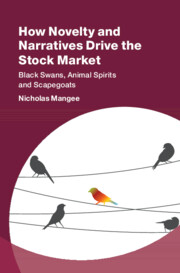Book contents
- Frontmatter
- Dedication
- Contents
- List of Figures
- List of Tables
- Preface
- Acknowledgments
- PART I NOVELTY, NARRATIVES, AND INSTABILITY
- PART II NEWS ANALYTICS AS A WINDOW INTO STOCK MARKET INSTABILITY
- PART III EMPIRICAL EVIDENCE FOR THE NOVELTY-NARRATIVE HYPOTHESIS
- 9 Corporate Novelty and Stock Market Outcomes
- 10 Narrative Intensity and Stock Market Instability
- 11 A Manual Novelty-Narrative Scapegoat Analysis
- 12 Applying Novelty and Narratives to Other Research
- 13 The Future of Novelty, Narratives, and Uncertainty in Finance
- 14 Concluding Thoughts and Future Research
- Appendix A R Code for Bloomberg News Word Cloud and Histogram
- Appendix B The Bloomberg News KU Stock Market Project
- Appendix C RavenPack Terms for Event Output Record
- Appendix D Unscheduled Events from RavenPack
- Bibliography
- Index
13 - The Future of Novelty, Narratives, and Uncertainty in Finance
from PART III - EMPIRICAL EVIDENCE FOR THE NOVELTY-NARRATIVE HYPOTHESIS
Published online by Cambridge University Press: 23 September 2021
- Frontmatter
- Dedication
- Contents
- List of Figures
- List of Tables
- Preface
- Acknowledgments
- PART I NOVELTY, NARRATIVES, AND INSTABILITY
- PART II NEWS ANALYTICS AS A WINDOW INTO STOCK MARKET INSTABILITY
- PART III EMPIRICAL EVIDENCE FOR THE NOVELTY-NARRATIVE HYPOTHESIS
- 9 Corporate Novelty and Stock Market Outcomes
- 10 Narrative Intensity and Stock Market Instability
- 11 A Manual Novelty-Narrative Scapegoat Analysis
- 12 Applying Novelty and Narratives to Other Research
- 13 The Future of Novelty, Narratives, and Uncertainty in Finance
- 14 Concluding Thoughts and Future Research
- Appendix A R Code for Bloomberg News Word Cloud and Histogram
- Appendix B The Bloomberg News KU Stock Market Project
- Appendix C RavenPack Terms for Event Output Record
- Appendix D Unscheduled Events from RavenPack
- Bibliography
- Index
Summary
This chapter suggests that the field of macro-finance is primed for a scientific revolution, or paradigm shift, in Kuhnian terms away from determinate modeling structures toward partially open ones that allow for novel Knightian uncertainty-related events, narrative dynamics, and the unanticipated structural change they engender. The chapter presents a discussion on recent developments representing aggregate behavior and outcomes in financial markets based on model ambiguity and intervallic change that is allowed to occur at times and in ways that would be difficult for any researcher to anticipate ex ante. The main findings of the preceding analyses of Chapters 4 through 12 will be woven into the discussion throughout. The modeling frameworks of Knightian Uncertainty Economics and Imperfect Knowledge Economics are discussed as potential approaches to be adopted in the post-paradigm shift in macro-finance.
Keywords
- Type
- Chapter
- Information
- How Novelty and Narratives Drive the Stock MarketBlack Swans, Animal Spirits and Scapegoats, pp. 307 - 329Publisher: Cambridge University PressPrint publication year: 2021

